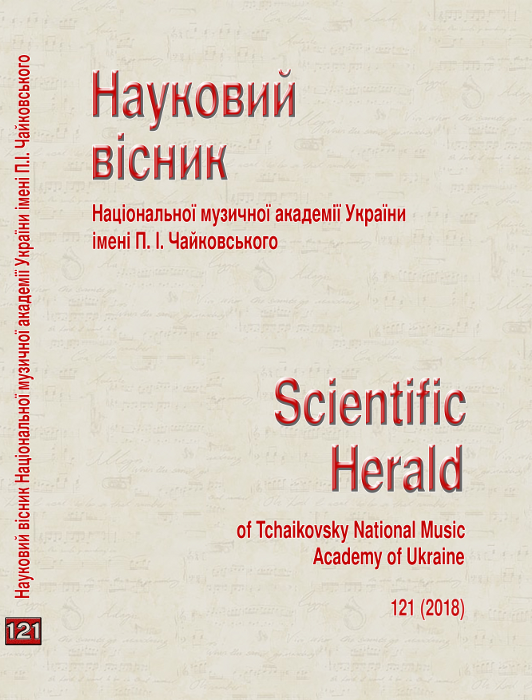“Ethno-chaos” of “Dakha Brakha” band as an example of the principle of “pile” in music
DOI:
https://doi.org/10.31318/2522-4190.2018.121.133225Keywords:
performances of Vladyslav Troitskyi, “DAKH“ Contemporary Art Center, performance, ethnic music, folklore, world music, postmodernismAbstract
The article analyzes peculiarities of the works of the band “Dakha Brakha”. “Dakha Brakha” is a modern Ukrainian music band, one of the most prominent representatives of world music in Ukraine. According to musicians, the main creative principle of “Dakha Brakha” may be expressed by the metaphor of “ethno-chaos”. The necessity of a theoretical substantiation of this title makes the relevance of the study. The leading position of the works of the band is revealed through the definition of “ethno-chaos”. With the purpose of indicating the peculiarities of the listeners' perception of the creativity of the group, were given fragments from various listeners’ feedbacks.) In the article are considered the basic principles of stylization of folk songs viewed in the music of “Dakha Brakha” on for the performances of "Mystic Ukraine” (“Prologue to “Macbeth””, “Richard III. Prologue”, “King Lear. Prologue”), as well as in the compositions of the band's albums (“Na dobranich”, “Yahudky”, “Na mezhi”, “Light” and others).
The main objective of the study is attribution of the principle of stylistic diversity in the work of the band.
Methodological base: for the purpose of using the correct musical terminology, was determined the type of musical creativity of "DakhiBrahi" (in accordance with the theory of musical practices of T. Cherednichenko) in relation to the group's creativity. There was made an attempt to attribute the principle of stylistic diversity to the works of the band. It points to the principle of eclecticism, and peculiarities of its organization – the principle of “pile”. This principle is concordant with the aesthetics of postmodernism and correlates with the principle of “pile” which is discussed in its theoretical works.
Conclusion is made about correlation of peculiarities of organizing eclecticism in the creative works of “Dakha Brakha” band with the “pile” principle, that is considered in the works of O. Zyn'kevych, T. Cherednichenko and О. Yakymovych.. Thus, the significance of the study is that the creativity of the “Dakha Brakha” band can be considered a manifestation of Ukrainian postmodernism.
Downloads
References
Vladislav Troitskiy: “Dzhaz – eto svobodnaya muzyika” [Vladislav Troitskiy: “Jazz is free music”]. Available at : http://www.dsnews.ua/politics/art32273 (accessed 08.12.2017). [in Russian].
Gankin, L. Retsenziya “Afishi” [Review of “Afisha”]. Available at : https://www.afisha.ru/concert/593349/ (accessed 08.12.2017). [in Ukrainian].
Gorbachev A. Fenomenalnyiy etnodzhazovyiy performans pro zhizn, smert i Gogolya [Phenomenal ethno-jazz performance about life, death and Gogol]. Available at : https://www.afisha.ru/concert/609136/reviews/afisha/ (accessed 08.12.2017). [in Russian].
Grigoreva, G. (1988). K voprosu ob eklektike v sovremennoy muzyike (opyit postanovki problemyi) [To the question of eclecticism in modern music (experience of a problem statement]. In : Muzyikalnoe myishlenie: problemyi analiza i modelirovaniya : Sb. nauchnyih trudov [Musical thinking : the problems of analysis and modeling: Collection of scientific works]. Kiev : Kievskaya goskonservatoriya, pp. 10–17 [in Russian].
“DahaBraha”. “Myi s massovoy kulturoy drug druga ne zamechaem” [“Dakha Brakha”: “We and mass culture do not notice each other”]. Available at : http://piter-news.net/other/2013/05/04/795.html (accessed 08.12.2017). [in Russian].
Zinkevich, E. (2007). Metamorfozyi muzyikalnogo postmoderna [Metamorphoses of musical postmodern]. In : Zinkevich E. Mundus musicae. Tekstyi i kontekstyi: izbrannyie stati [Mundus musicae. Texts and contexts: selected articles]. Kiev : Zadruga, pp. 517–528 [in Russian].
Konen, V.(1994). Tretiy plast: Novyie massovyie zhanryi v muzyike XX veka [The third layer: New mass genres in the music of the 20th century]. Moskva : Muzyika, 160 p. [in Russian].
Kryilova, L. (1975). Funktsii tsitatyi v muzyikalnom tekste [Functions of quotation in a musical text]. Sovetskaya Muzyika, 8, pp. 92–97 [in Russian].
Pits, T. “DakhaBrakha”: “Mayemo buty syl'nymy” [“Dakha Brakha”: “We have to be strong”]. Available at :http://molbuk.ua/vnomer/kultura/39709-dakhabrakha-mayemo-buti-silnimi.html (accessed 08.12.2017). [in Ukrainian].
Cherednichenko, T. (1999). Brend-estetika [Brand-aesthetics]. Neprikosnovennyiy zapas, 5, pp. 73–79 [in Russian].
Cherednichenko, T. (2002). 70-e. Muzyikalnyiy zapas. Problemyi. Portretyi. Sluchai [Musical stock. 70ss. Problems. Portraits. Cases]. Moskva: Novoe lit-e obozrenie, 592 p. [in Russian].
Yakimovich, A. (1993). Magicheskie igryi na gorizontalnoy ploskosti. Kartina mira v kontse XX v. [Magic games on a horizontal plane. A pictures of the world at the end of XX century]. Mirovoe Drevo, 2, pp. 121–136 [in Russian].
Downloads
Published
How to Cite
Issue
Section
License
Our journal abides by the CREATIVE COMMONS copyright rights and permissions for open access journals.
Authors, who are published in this journal, agree to the following conditions:
The authors reserve the right to authorship of the work and pass the first publication right of this work to the journal under the terms of a Creative Commons Attribution License, which allows others to freely distribute the published research with the obligatory reference to the authors of the original work and the first publication of the work in this journal.
The authors have the right to conclude separate supplement agreements that relate to non-exclusive work distribution in the form in which it has been published by the journal (for example, to upload the work to the online storage of the journal or publish it as part of a monograph), provided that the reference to the first publication of the work in this journal is included.




